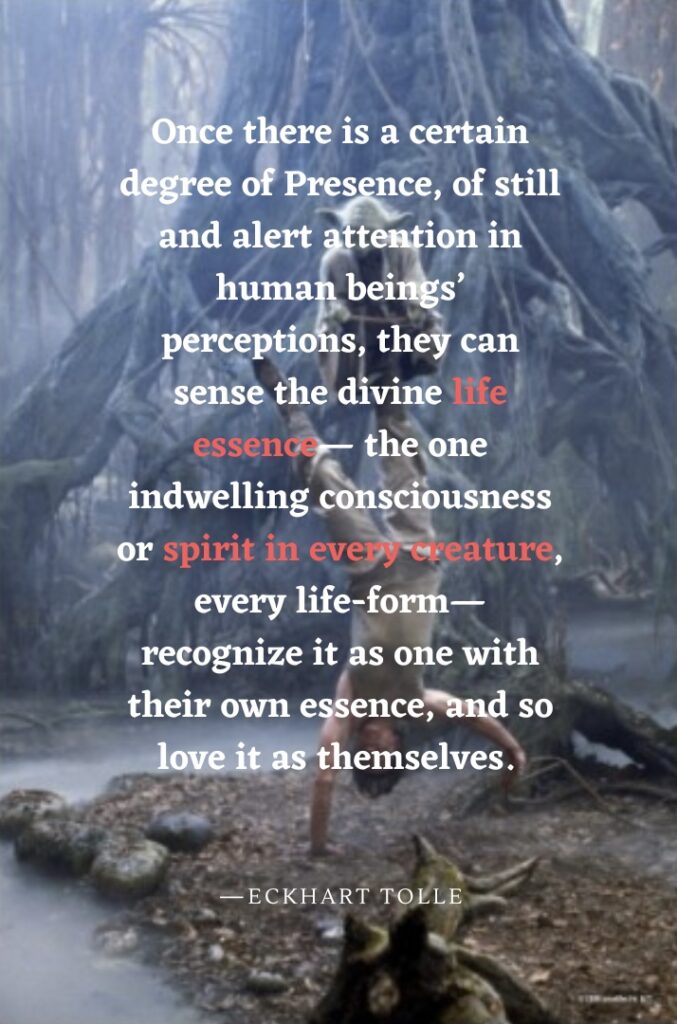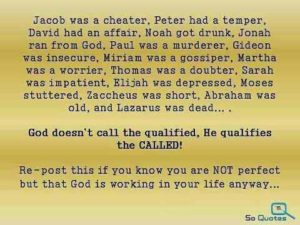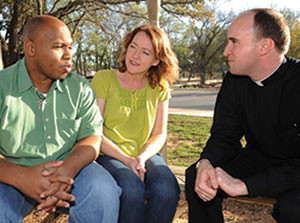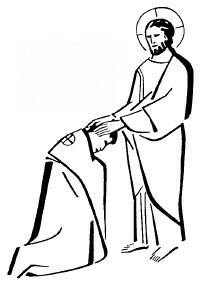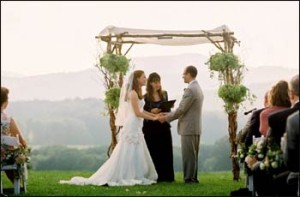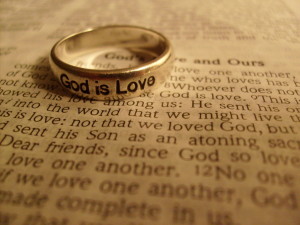 My sermon today had us discussing empathy vs. sympathy afterward and how empathy is very important for spiritual healers and clergy to possess. We ordain a lot of clergy of all different faiths and religions, and have noticed empathy is the one trait an ordained minister or rabbi, priest or imam should have, and also something all successful clergy have in common (along with a high emotional intelligence known as EQ).
My sermon today had us discussing empathy vs. sympathy afterward and how empathy is very important for spiritual healers and clergy to possess. We ordain a lot of clergy of all different faiths and religions, and have noticed empathy is the one trait an ordained minister or rabbi, priest or imam should have, and also something all successful clergy have in common (along with a high emotional intelligence known as EQ).
Opening up yourself to actually experience the feelings of another person, is empathy. The saying “God is Love” is such a cliché these days that no one is quite sure what it means the first time they hear it, especially young people. God is Love can be better understood if you translate it in your mind to “God is Empathy”. Just then a thesis paper came in from one of the Seminary’s Master of Arts degree candidates positing that Love is the Universal Religion. She is earning her Masters in Metaphysical Studies. We all read her paper and I thought … hmmm… Love / Empathy is the Universal Religion. HERE’s her paper.
LOVE IS A UNIVERSAL RELIGION, by Rev. Jena R. Harris, D.Div.
Why I choose LOVE as my Religion and Love is a Universal Religion
Why do I choose love as my Religion? To be able to say this took me many years of self-growth, self-love, and spiritual maturing. You will find in the following chapters some of my research regarding Eastern and Western Religion, and Spirituality. In this Thesis you will see things that each Religion has in common and things that they are so very different. I hope this thesis will get you to dig deep and also question your own belief system and how we all have been shaped and formed based on our childhood experiences and how the Religious or lack of Religious background that we had.
The word “religion” derives from the Latin religare, “to bind”. All Religions, at the source, emerge to serve this function. Religions last when they continue to connect their followers. There many beings these faiths have supported, many lives enriched with courage, and hearts replenished. Yet, as a world, we still have wars over Religion. We fight amongst ourselves and other countries to prove through our own man-made egos that our choice of Religion is the only way to get to God.
The Eastern faiths share some fundamental principles which are less apparent in Western faiths, for example, the high value placed on duty, the sense of connection with ancestors, and behavior guidelines based on a goal of societal harmony. Western Religions are much more structured and have expectations on the followers under certain guidelines, and many times in certain sanctuaries, can be controlling through fear-based thinking.
The New Age Movement is in a class by itself. Unlike most formal religions, it has no holy text, central organization, formal membership, ordained clergy, geographic center, dogma, or creed. They often use mutually exclusive definitions for some of their terms. Spirituality and New age is in fact a free-flowing, decentralized, spiritual movement. It is a network of believers and practitioners who share somewhat similar beliefs and practices, which many add on to whichever formal religion that they follow. Seminars, conventions, books and informal group settings replace sermons and religious services. Spirituality, unlike the Eastern and Western Religions promote self-growth, self-love, self-realization, awareness, and group consciousness with God/Universe. Yet, even in some situations and around some “new agers” if you mention “God” or “Jesus” they think you are a devoted Christian, and rebel.
The one thing that I can say, in my experience with the Religions I have been exposed to, is that I resonate most with New Age/Metaphysics/ Spirituality. My reasoning will become apparent by the time you reach the end of this Thesis, and my one main focus has always been LOVE. This is one thing as a child I kept hearing from my team of Angels, and something that I have always carried with me, is that through anything in life, you should always go through the vibration of love.
The world today has been torn apart through judgment, racism, war, greed, and ultimately through hate. Many people have had bad experiences with Religion in their childhood where they felt Religion as being forced onto them, when their innate spirit didn’t resonate with the teachings. This has kept them paralyzed in fear, or in so much anger that they resist anything that remotely sounds like religion, God, or Jesus. I grew up in a family that had many different Religious choices. I have aunts, uncles, and cousins who are Mormon, Christian, Seventh Day Adventist, and even a few who are against Religion of any kind. In our household my mom let us choose, she never forced it. We did go to Sunday School, and it was mostly Christian based. I do remember a few times at our family events and reunions, usually Christmas, there would be at least one argument or fight break out about things regarding Religion. Probably because of all of the diversity, but even as a child I didn’t understand this. As a young child, as I attended the different Churches I could feel truth, but still did not fully resonate with all of the teachings. This left an undeniable feeling of incompleteness inside of my heart. I know that I am not alone with these feelings, as I have heard this same sort of mutual feeling from others.
As I grew in my own self love and spiritual maturity, I realized that I resonated with many parts of the Religions but also the “New Age”. I began to ask myself, how would this work? How can I say I am Christian, believe in Jesus, yet completely resonate with Aura’s, energy, energy healing, and the Universal Laws? I knew there was no “Religion” that would totally accept me if I could be completely honest and openly share my heart. I made myself fit into the box of whatever Church I was at, but at some points that I didn’t feel truth, I felt uncomfortable.
Many questions began to surface, where do I fit in, I would often ask myself, trying to fit in that box. Certainly, it was apparent that I still cared a great deal about what other people thought of me, because I still couldn’t share how I truly felt with many people in my life. The fact that I didn’t fully resonate with all aspects of any specific Religion. Yet still had this overwhelming feeling of love inside that tugged at my heart, this insatiable thirst that wasn’t being quenched. Wanting to make a difference in the world, and help people find God through love. I made my first step into my healing path and attained my certificate in Holistic Life Coaching. After I achieved this certificate I continued to grow and decided to step into the healing world of Reiki. This soon led me to becoming a Reiki Master and soon following became an Ordained Minister. Shortly after that I was led into the self-healing modality of Laughter Therapy.
As I continued my practice, I embraced all of what I was learning to help people gain a deeper connection within themselves. Ultimately, what follows after self-love, is a natural flow of a deeper closeness with God. We each are connected to God through love, and when we practice self-love it is a natural bridge that begins to form. One day as I was coaching a woman who didn’t have God in her life at all. She was raised in a very strict Religious family, and learned to fear God. She felt as though she was born a sinner and was destined to hell. Even the simple mentioning of “God” made her energy tightly restrain. As I worked with her, I replaced the word “God” with LOVE, a word that she did resonate with, and something magical began to take place, she began to heal. She began to heal in such a way that after time she was able to have God back in her life. Creating a new relationship, only this time it was built on love, not fear. As time went on and I grew spiritually, this sort of ministering and healing became common for me. I soon realized the way we are going to heal the world is through love.
At this current time in society, we have families breaking apart, Churches falling apart, riots and fights regarding race, religion, and sexual orientation. We have war and hate, and the children coming into this world are being exposed to some horrific problems. What we have been doing has not been working, we need to come together not pull apart. We need to lock arm to arm, neighbor to neighbor, and stop giving hate and choose love. Come together with a purpose of solutions, solutions for real world change. This is my mission and what I see that we are missing in all of these things is lack of love. The world is suffocating right now with hate and violence. We need to allow our children to laugh and play, and we as adults need to remember how to laugh and play. Joy and love is so desperately needed in our world.
I want to end this with a simple thought, and it really is a simple answer. There is no right or wrong way in the course of God when you chose the path of love. Love is the final answer, to the path of healing couples, families, society, and our world. Love will lighten even the darkest hatred, love will heal the deepest pain, love will comfort the loneliest soul. Love is the strength that feeds and nurtures our deep innate desire of wanting to be accepted. At the source of most world fighting, we really are seeking a deeper connection to ourselves and God. We can attain this through the expansion of love. Through this deep expansion, bridges the gap between mankind, and mother earth. This powerful energy that is fed directly to the one source that unites us all together, GOD. It doesn’t matter what your choice for the path (Religion) to get to God, as long as the path is walking through love. God commands us to love one another. Love is God, God is love, therefore LOVE IS THE UNIVERSAL RELIGION. This is why I believe that LOVE is, at the source, the foundation, of a Universal Religion.
EASTERN RELIGIONS
Hinduism, Buddhism, and Jainism
Common Features:
- Philosophy of Karma
- Continuity of Life (Reincarnation)
- Mystical (Human Experience)
- Self Realization (Direct contact with God/Self)
- Individual
- Freedom to choose God(s)/no God
- Human Suffering – Soul’s Ignorance
- No Judgment Day No Eternal Hell/Heaven Liberation (Moksha)- Eternal Scripture Has Limited/No Authority Worshipping – All Day Universe Exists in Endless Cycle Religious Symbols (OM, Swastika, Lotus) Cremation
Systems of Philosophy Developed
- Brahmana System (Hinduism)
- Samana System (Jainism, Buddhism)
Brahmana System-HINDUISM
- God – Creator, Preserver, Destroyer
- God is universe/universe is God
- At death, soul merges with God (soul becomes infinity)
- Scriptures have certain authority
- Vedas, Upanishads, Geeta, Brahma Sutra
- Scriptures are in Sanskrit
- Highly Ritualistic
- Animal sacrifice in the past
- Duties of Individuals (Caste Systems)
- Time is Cyclic
Philosophy of Brahmana System
Yoga
- Bhakti Yoga
- Enjoyment of Supreme Love and Bliss
- God realization/oneness with everything
- PaJnan Yoga
- Realization of unique and supreme self
- Karma Yoga
- Discipline of selfless actions as a way to perfection
- Raj Yoga
- Training the mind, connecting with the life force and withdrawing into the highest states of spiritual life
- Samkhya
- Atheistic and strongly dualist theoretical exposition of consciousness
- Nyaya
- Explores sources of knowledge
- Vaisesika
- Empiricist school of atomism
- Earlier Mimasa
- Anti-ascetic and anti-mysticist school of orthopraxy
- Later Mimasa (Vedanta)
- The last segment of knowledge in the Vedas, or the ‘Jnan’ (knowledge) ‘Kanda’ (section)
Caste Systems (Duties of Individuals)
- Priests-intellectuals
- Brahmins
- Establish and preserve the national ideas and philosophy
- Rulers and warriors
- Kshatriyas
- Protect the state from external aggression and establish internal order
- Merchants and artisans
- Vaishyas
- For the production of national wealth
- Sudras
Shramana System-BUDDHISM and JAINISM
- God – Not a Creator Humans are capable to achieve the highest spiritual state
- Human experience or self realization is the ultimate authority
- Scriptures have no authority
- Primary Source:
- Path of Knowledge (Jnan Yoga)
- Realization of unique and supreme self through knowledge
- Self control, nonviolence, penance, and meditation
- Revolt against Hindu caste distinction, fancy rituals, and animal sacrifice
Buddhism:
The Supreme is completely transcendent and can be described as
- Sunya (zero), a void, an emptiness, state of non-being at nirvana
- Being turns into a state of non-being, emptiness void, or Sunya
- Being looses its identity and becomes nothing
- No focus on the future or the past, one lives at the present moment
In Samsar (world) a being is a combination of physical and mental forces/energies. Desire “thirst” to be and to become is the root cause of suffering and rebirth. Life’s aim is to end suffering through Nirvana, which is:
- Passion-less peace, perfect insight, enlightenment, perfect knowledge, immortality
- Man’s true nature is divine and eternal
- Preaching the greatness of self giving love and compassion towards all creatures
- Middle path consist of living moderately and avoiding extreme
Scriptures –
- Tripitika for Theravad sect, Sutras for Mahayan
- Written in Pali language
Jainism:
- God is a pure consciousness or perfected soul
- without any karma attached to it
- The primary goal is to become a perfected (liberated) soul, known as Siddha or God
- At liberation the soul remains finite, lives on Moksha forever, and never loses its identity
- Every living being is eternal, individual, and capable of becoming perfect
- The path of liberation is as follows: Right perception, right knowledge, and right conduct
- One must conquer one’s desire by one’s own effort to attain liberation
- Intentions behind actions of body, mind, and speech bind karma particles to us in this world
- Nonviolence followed in action, thought, and speech is the highest religion
- Self purification, penance, austerity, and meditation are essential for liberation
Scriptures –
- Agam Sutras
- Written in Ardha-magdhi language (vernacular)
- Scriptures guide moral and spiritual life to ultimately attain liberation
Western Religions
Catholicism, Mormonism, and Christianity
Common Features:
- One Life and Eternal Judgment
- Judgment Day
- One God
- God’s Message Revealed Through Prophet
- Non-mystical (God chooses Prophet)
- Congregational (Society is Essential)
- Scripture has Ultimate Authority
- Human Suffering – Disobedience of God’s Will
- Worshipping – Sabbath Day
- Universe was Created By God
Catholicism
The faith, practice, and church order of the Roman Catholic Church with adherence to the forms of Christian doctrine.
Philosophy
- To gain the happiness of heaven one must know, love, and serve God in this world. Man must know, love and serve God in a supernatural manner in order to gain happiness of heaven. Man is raised to the supernatural order only by grace, a free gift of God.
- Disciples learn to know, love, and serve God from Jesus Christ, the Son of God, who teaches us through the Catholic Church.
- In order to be saved, all persons who have attained the use of reason must believe explicitly that God exist and that he rewards the good and punishes the wicked; in practice they must also believe in the mysteries of the Blessed Trinity and the Incarnation.
- Blessed Trinity:
- One and the same God in three divine persons, the Father, the Son, and the Holy Ghost.
- By the Incarnation is meant that the Son of God, retaining His divine nature, took to Himself a human nature, that is, a body and soul like ours.
- The Church is the congregation of all baptized persons united in the same true faith, the same sacrifice, and the same sacraments, under the authority of the Sovereign Pontiff and the bishops in communion with him.
- Belief that chief truths are taught by Jesus Christ through the Catholic Church in the Apostles’ Creed.
- Apostles’ Creed:
- I believe in God, the Father Almighty, Creator of Heaven and earth; and in Jesus Christ, His only Son Our Lord, Who was conceived by the Holy Spirit, born of the Virgin Mary, suffered under Pontius Pilate, was crucified, died, and was buried.
Hierarchy
- Pope
- Bishop of Rome and successor of Peter, is the visible and perpetual foundation of unity among the bishops and among Christ’s faithful. The Bishop of Rome has, by virtue of his role as the Vicar of Christ and as Pastor of the entire Church, a full, supreme and universal authority.
- Cardinal
- Cardinals are bishops or archbishops that have been given special designation to be eligible as the next pope. They are appointed by the pope.
- Bishop
- The principal teacher in his diocese and has a responsibility to preach the Word of God to his people. He must ensure that those delegated to teach in his name, namely priests, teachers, catechists and others, teach the truth.
- Priest
- A Priest is essentially assistants to the (arch)diocesan bishop. They help the (arch)bishop by celebrating the rituals with all the people in the different parishes. Since many (arch)dioceses are too large for the (arch)bishop to conduct mass and other rituals for all the people he grants priests the authority to do so in his place.
Mormonism
Religious beliefs and practices of members of The Church of Jesus Christ of Latter-day Saints. Mormonism describes the doctrines of the Church that were restored to the earth through the Prophet Joseph Smith.
Philosophy
- Belief in God, the Eternal Father, and in His Son, Jesus Christ, and in the Holy Ghost
- Man will be punished for their own sins, and not for Adam’s transgression
- Through the atonement of Christ, all mankind may be saved, by obedience to the laws and ordinances of the gospel
- First principles and ordinances of the gospel are:
- Faith in the Lord Jesus Christ
- Repentance
- Baptism by immersion for the remission of sins
- Laying on of hands for the gift of the Holy Ghost.
- A man must be called of God, by prophecy, and by the laying on of hands, by those who are in authority, to preach the gospel and administer in the ordinances thereof
- Belief in the gift of tongues, prophecy, revelation, visions, healing, interpretation of tongues
- Bible to be the word of God, as far as it is translated correctly; we also believe the Book of Mormon to be the word of God.
- God has revealed, all that he does now reveal, and he will yet reveal many great and important things pertaining to the Kingdom of God.
- Gathering of Israel and in the restoration of the Ten Tribes
- Zion will be built upon this [the American] continent
- Christ will reign personally upon the earth
- The earth will be renewed and receive its paradisiacal glory.
- Worship God according to the dictates of our own conscience, and allow all men the same privilege, let them worship how, where, or what they may.
- Belief in being subject to kings, presidents, rulers and magistrates, in obeying, honoring and sustaining the law.
- Mindful intentions; honesty, truth, chaste, benevolence, and virtue. Follow the teachings of Joseph Smith in the Book of Mormon
Hierarchy
- Bishop
- Highest priesthood office of the Aaronic priesthood in the Latter Day Saint movement; is the leader of the Aaronic priesthood in a given ward or congregation.
- Priest
- Under the Bishop in the priesthood office in the Aaronic Priesthood of denominations within the Latter Day Saint movement.
- Teacher
- Prepare the sacrament, home teaching, all rights of a Deacon
- Deacon
- Keys of the ministering of angels; pass the sacrament to the congregation; collect fast offerings; other duties as assigned by Bishop
Spirituality/New Age/Metaphysics
Common Features:
Holistic view
“Age of Aquarius”
Channeling
Mystical
Angels
Tarot
Metaphysics
Energy
God as being source
Universe as God source
Self as God
Consciousness/collective consciousness
Mindfulness
Philosophy:
The term New Age refers to the coming astrological “Age of Aquarius”. The New Age movement includes elements of older spiritual and religious traditions ranging from pantheism, polytheism, ecology, astrology, combining science and Gaia philosophy. Often Spirituality uses practices of physics, metaphysics, and psychology. New Age practices and philosophies sometimes draw inspiration from major world religions as well such as: Buddhism, Taoism, Christianity, and Hinduism. Many New Age Teachers, Leaders, and healers have strong influences from Esotericism, Gnosticism, Idealism, Neopaganism, and new thought.
- The New Age subculture already existed in the 1970s, and arguably continued themes from the 1960s counterculture. Earlier generations would have recognized some, but not all, of the New Age’s constituent elements under the practices of Spiritualism, Theosophy, or some forms of New Thought / the Metaphysical movement, all of which date back to the nineteenth century, as does alternative health. These movements in turn have roots in Transcendentalism, Mesmerism, and various earlier Western
- esoteric or occult traditions, such as the Hermetic arts of astrology, magic, alchemy, and Kabbalah.
Metaphysics:
Metaphysics is a philosophy that is responsible for the study of existence, a the foundation of a worldview. It really encompasses everything in our world that exists, as well as the nature of existence itself. The word metaphysics comes from Ancient Greece, where it was a combination of two words. Meta, meaning over and beyond and physics, combined with a meaning of over and beyond physics. Metaphysics helps an individual with differences between reality and illusion, a fundamental view of the world around us. The degree to which our metaphysical worldview is correct is the degree to which we are able to comprehend the world, and respond accordingly.
New Age:
New age is a term that is commonly used for a wide range of spiritual and social movements. These movements developed in the 1960’s and 1970’s, with a specific focus on spirituality, and matters regarding individual spiritual evolvement, with an emphasis on individuality. Many New Age believers typically take a pick and mix approach to spirituality, adapting beliefs and practices from a wide variety of sources such as Buddhism, Mysticism, Zen and Tibetan practices.
Spirituality:
In modern times, spirituality is the emphasis is on subjective experience. Many believers follow paths to enlightenment, as they are on a self-seeking journey to embrace religion and self-transformation. The traditional meaning of spirituality is a process of “re-formation” which goals are to recover the original shape of man within the image of God. Spirituality is really a broad concept with a lot of room for a multitude of perspectives. In general, it includes a sense of connection to something bigger than our own selves, and it typically involves a search for meaning in life. It is a universal human experience, something that touches and affects us all.
